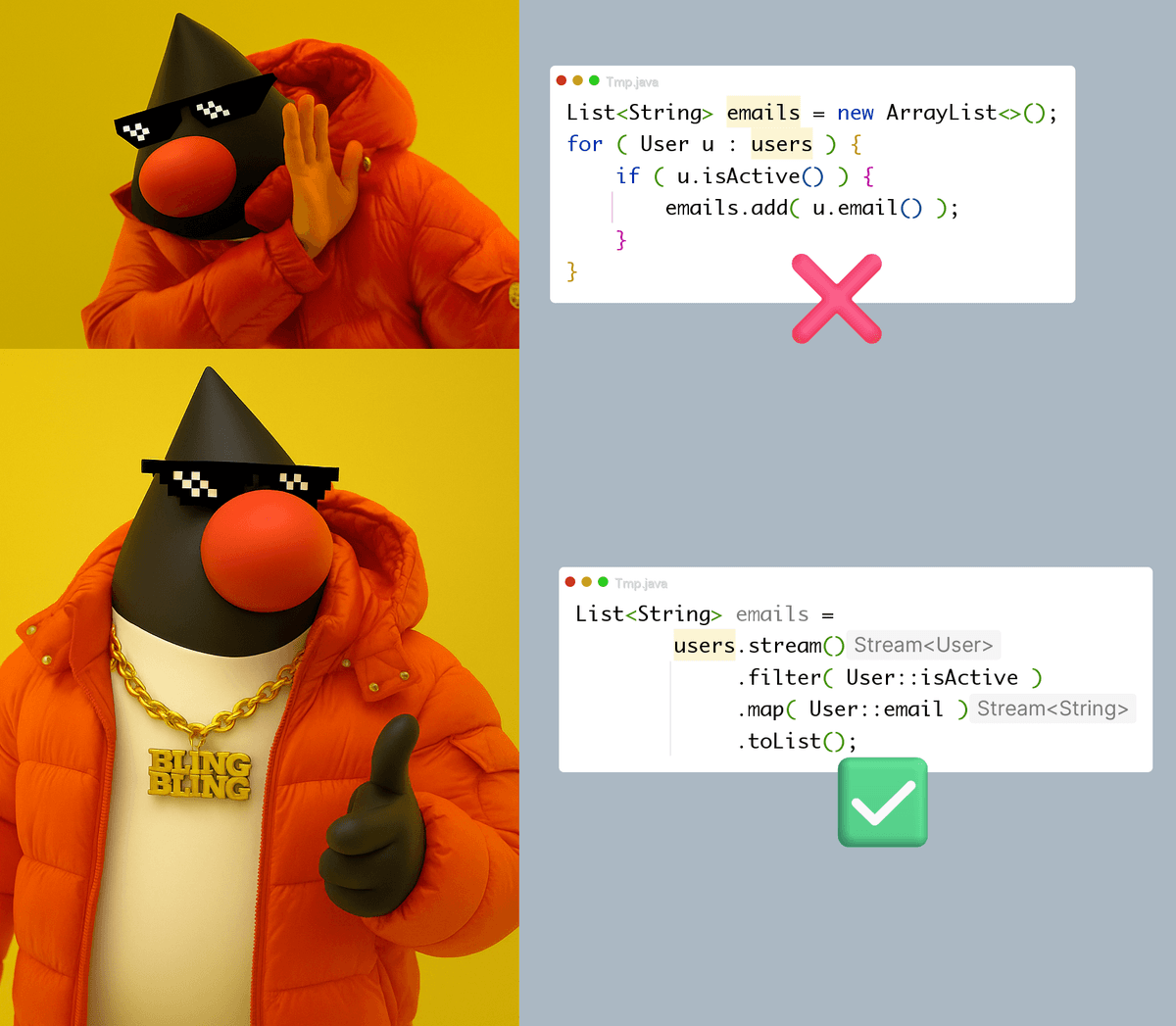🔸 TLDR
Using Java Streams (filter, map, collect, etc.) makes your code shorter, more readable, and easier to test. You describe WHAT you want, not HOW to do it step by step. 🚀
But: readability first. Streams are great when they stay clear. 😎

🔸 WHY PIPELINES INSTEAD OF LOOPS? 🤔
▪️ You express intent ("give me all adults' names") instead of manual plumbing (for, if, add).
▪️ Less mutable state → fewer bugs. 🐛
▪️ Easier to chain transformations.
▪️ Easier to test each step.
▪️ Often one-liners instead of 15 lines of boilerplate. ✂️
🔸 EXAMPLE 1 — KEEP ONLY WHAT YOU NEED 🙌
Goal: from a List users, get emails of active users.
Loop version (classic) ❌
This works, but:
- We manually control iteration
- We mutate a list
- "Why are we doing this?" is not obvious at first glance
Stream pipeline version (intent first) ✅
Now we literally read the requirement:
- take users
- keep only active
- take their email That’s business language in code. 💡
🔸 EXAMPLE 2 — TRANSFORM + SORT + LIMIT 🔥
Goal: top 5 product names in uppercase, sorted by price desc.
Loop version (manual work everywhere) ❌
A lot of ceremony, a lot of places to make mistakes.
Stream pipeline version (composed steps) ✅
This is basically a SQL query in Java style. Clean. Declarative. 💅
🔸 EXAMPLE 3 — COUNTING / AGGREGATION 📊
Goal: how many users are minors (<18)?
Loop version ❌
Stream version ✅
No temp variables. No manual increment. Just “count users under 18”. ✅
🔸 WHEN NOT TO USE STREAMS 😬
▪️ When the pipeline becomes unreadable (10+ operations in one line = 😵).
▪️ When you need complex side effects in the loop (logging, multiple mutations, break/continue logic).
▪️ When performance is critical and you measured (not guessed!) that the stream allocation hurts. 🧪
Rule of thumb: if the Stream reads like a sentence, use it. If it looks like dark magic, don't.
🔸 TAKEAWAYS 💡
▪️ filter = keep only what matches a rule.
▪️ map = transform each element.
▪️ collect / toList() = give me the result.
▪️ You get code that looks like requirements, not plumbing.
▪️ Clean code is not "shortest code" — it's "fast to understand".
#java #cleanCode #softwarecraftsmanship #readability #developer #streams #codinghabits #programmingtips
Go further with Java certification:
Java👇
Spring👇
Spring👇
🗣️ Alex said:
I should admit, after a few years of using declarative (vs imperative) approach, I found out sometimes it's still "cleaner" to have those old boring loops. It's for cases when usual "functional" manipulations of streams lead to cumbersome hard to grasp code.
🗣️Yusuf said:
Absolutely. Moving beyond the imperative `for` loop means trading manual index management for clear data transformation pipelines. The true sign of a Java expert is knowing when that declarative syntax starts hiding unnecessary boxing or turning simple sequential operations into memory-hungry parallel processing failures